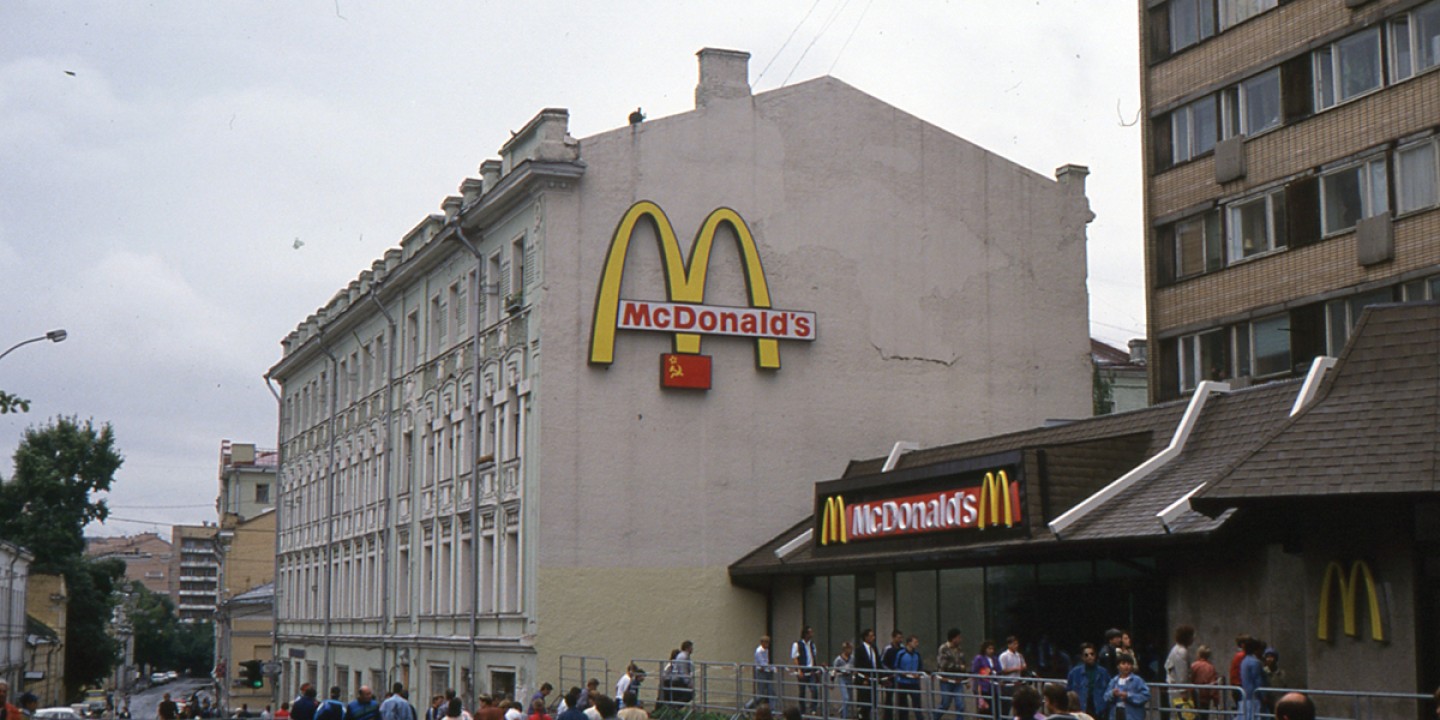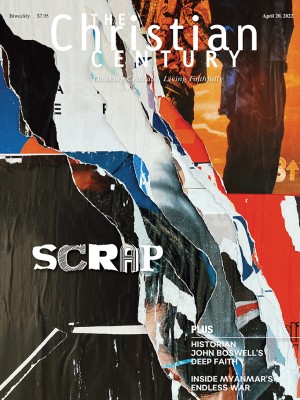I went to the first McDonald’s in Russia for the bathroom
As the Soviet Union crumbled, the West sent French fries.

In 1991, when I was a student in Russia, the recently opened McDonald’s in Moscow served as a symbol, as a tourist attraction, and as the only place—and I mean the only one—with a clean public bathroom. The whole idea of clean public bathrooms was foreign in Russia at that time. We marveled as our Russian friends took us on long excursions and never needed to use the restroom. It seemed nothing shy of miraculous, and we worked on training our bladders so that we wouldn’t have to use the bathroom either.
But during our time in Moscow, the fresh, bright, clean McDonald’s was respite and beacon. The lines were legendary. Rumor was that it could take hours to go in and order a hamburger. But the bathroom: now there was capitalism I could get on board with.
Read our latest issue or browse back issues.
At home in the United States, I never went to a McDonald’s. I considered the food poor and the atmosphere ridiculous. McDonald’s represented what my 19-year-old self saw as the worst of American culture. At the very moment when I was standing in line at the Moscow McDonald’s, waiting for the Soviet Union to finish collapsing, I considered McDonald’s itself to be potentially responsible for the downfall of Western civilization.
My Russian companions, Vadim and Masha, loved the new McDonald’s. They also loved Goldie Hawn, Steve Martin, and jazz. They wanted ordinary things from their lives: decent living conditions, space in which to raise children, and access to cultural goods. Looking at the cultural ruin around them, they were applying to move to the United States and become citizens.
When Vadim, Masha, and I went to McDonald’s, we only stood in line for ten minutes, and I found that the crispy, greasy fries tasted like a little bit of heaven. They tasted like home.
This is a common experience for tourists. When you are far from home, the things of home suddenly seem sweeter and more meaningful. But McDonald’s wasn’t the equivalent of my grandmother’s chocolate chip cookies. McDonald’s was a symbol of something far bigger than such personal nostalgia: the Cold War, and which side ostensibly won it.
I was a symbol, too, as an American in Russia a few months before the official end of the Soviet Union. Everywhere we American students went, our civilization was being favorably compared to theirs. We—the Americans—had better shoes. Our currency was more valuable. We could go into the hard-currency grocery store and buy foreign-made cookies and candy. We were the victors in a battle that had been going on all our lives and for much of the lives of our parents and grandparents. This victory had its most dominant symbol in the McDonald’s in Moscow.
When the Soviet Union collapsed after decades of isolation and repression, the United States had an incredible opportunity. We might have recognized the moment for building democracy in Russia, a place that had no tradition for it, as one that required our sincere effort and support. After World War II, the United States launched an ambitious plan to rebuild both Japan and Germany economically and politically. The primary movers in the Marshall Plan were economic—and Americans came to believe that opening markets, in and of itself, promoted democracy. In Russia, this did not prove to be true. Americans made the mistake of equating McDonald’s with freedom, and Russians made the mistake of equating democracy with the chaos that rapidly consumed their country in the 1990s.
Back in 1991, the temptation to gloat amongst the American students in my cohort was high. One day, as the ruble was collapsing, an American student burned a hundred ruble note—the equivalent of someone’s monthly salary. He did it because he could, because it felt good to notice that Russia’s currency was worth nothing to him.
When I heard last month that McDonald’s was temporarily shutting down in Russia as a response to President Vladimir Putin’s invasion of Ukraine, this student’s act was one of the first things I thought of, along with the clean bathrooms and that sense of sparkly capitalism incoherently attached to freedom and democracy. At that moment, it seemed that the worst of American culture had somehow won against the worst of Russian culture, but it didn’t feel like much of a victory.
At this moment, I see more meaning in the struggle against Russian authoritarianism. But I also see in that McDonald’s a cautionary tale. To whatever degree Americans continue to conflate capitalism with democracy, we seem to feed into the forces of authoritarianism that are determined, like Putin, to prove that prosperity in fact depends on an authoritarian order.
The problem that was easy to observe in 1991 is very close to a problem that we have now: how Americans should orient ourselves morally vis-à-vis Russia and Russians. The mistake we have made again and again is to position ourselves as the morally superior actors simply because of our better economic position. It’s a sort of prosperity gospel working at the highest levels of our economy and government. We are blessed because we are rich. We are rich because we are blessed.
This leads us to fail again and again to look at the ways that our moral failings have shaped the world in which Putin is acting. We could point in many directions: our own wars fought in violation of international law, our willingness to look the other way as Putin and Bashar al-Assad destroyed Syria to save it, our environmental record and its relationship to companies such as McDonald’s, our failure to support fledgling democratic efforts in Russia itself in the name of capitalist expansion. We have helped to create the conditions in which Putin saw an opportunity to impose a new reality on the ground.
Before I went to Russia in 1991, I attended several lectures meant to prepare me for what I was going to find there. These lectures promoted American superiority and repeated Cold War phrases like “the free world.” They routinely conflated capitalism with democracy. Thirty years later, I hear those same strains all around me.
Don’t get me wrong: I want the United States to act on behalf of Ukraine. I lived there just after the Orange Revolution in 2004. I cheered on my friend Alya as she participated in the Maidan Revolution in 2014. I was in awe over what she and others accomplished. Ukrainians’ longing for democracy is real and alive and deserves to be defended—and I believe, as Ukrainian president Volodymyr Zelensky has said again and again, that Ukrainians are fighting on our behalf.
I am as baffled as anyone as to what we should do about this, how to truly help this fragile democracy find the foundation on which it can stand. But I know that we did no good in 1991 when we boasted and bullied a new Russia that was trying to find its way. Where there could have been a Marshall Plan, there was a McDonald’s. It never truly served as a substitute.
A version of this article appears in the print edition under the title “Fast food isn’t freedom.”







